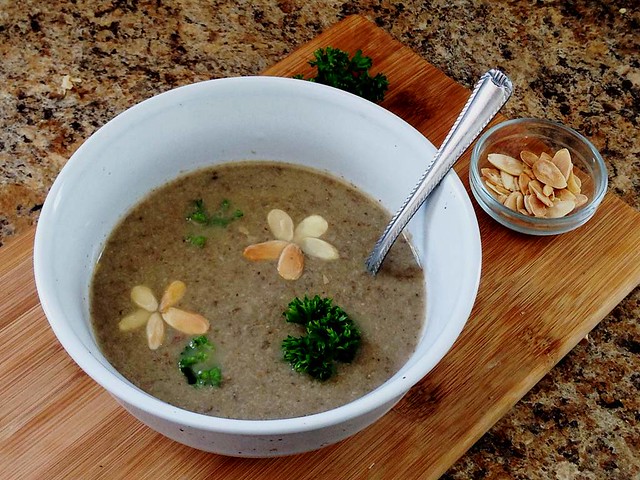Posted by Dr. Ben Kim on Feb 23, 2015
This is a lovely recipe for vegans and non-vegans alike. Rich in healthy protein and bone-building minerals, this mushroom soup offers protection against cardiovascular disease, strengthens immune function, and helps reduce inflammation throughout the body - simply do a search through the online archives at the National Library of Medicine and you'll confirm these and other health benefits from regular consumption of button and cremini (sometimes spelled crimini) mushrooms.
 Read more
Read more
Posted by Dr. Ben Kim on Feb 23, 2015
The ingredients listed below make about 4 servings
Ingredients: Read more
Posted by Dr. Ben Kim on Feb 17, 2015
I've long maintained that pasteurized and homogenized dairy products should be avoided whenever possible, as regular intake of cooked casein in dairy is associated with a number of health challenges, the most common of which are chronic ear infections, nasal congestion, acne, eczema, a variety of autoimmune illnesses, and even cancer.

I almost never eat dairy products, but like a lot of people who follow a dairy-free diet, I find myself craving different types of cheese from time to time. If you're like me and long for the texture and flavor of cheese on occasion, I hope that you give the following recipe for raw, dairy-free dill cheese a try. In the proportions listed, this recipe comes out as more of a cheese dressing; if you prefer it thicker and richer, start with less water when you blend and adjust if necessary by adding small amounts of water. Read more
Posted by Dr. Ben Kim on Feb 10, 2015
Red beets are right at the top my list of foods that everyone should aim to eat at least a few times a week. Per ounce, few other foods are as dense in nutrients that prevent cardiovascular disease, all types of cancer, and neurological damage associated with high homocysteine levels.

Red beets are especially rich in folate, which is why they are useful for lowering blood homocysteine and reducing risk of birth defects.
If you have a problem with constipation, red beets and their green tops are likely to provide significant relief. Both are rich in fiber that can help keep waste materials moving through your gastrointestinal tract at a healthy pace. Read more
Posted by Dr. Ben Kim on Feb 10, 2015
Here is nutrient-rich salad that is lovely during cold winter months. The quantities listed below make 2 large or 4 small salads.
Ingredients:
Half a pound (8 ounces) of fresh spinach, washed and ready to eat
3 medium or 4 small red beets, peeled
1 cup whole pecans
1 small red onion, thinly sliced
2 tablespoons of raw honey or real maple syrup Read more
Posted by Dr. Ben Kim on Feb 04, 2015
Who doesn't enjoy creamy sauce over noodles and crisply cooked veggies? The problem with dairy-based cream sauces is that they are rich in casein, the animal protein that T. Colin Campbell of The China Study has linked with increased risk of cancer.
Thankfully, you can make a dairy-free cream sauce that has lovely flavour and texture and can lower your risk of all types of cancer.

The key ingredient is cauliflower, one of nature's best sources of indole-3-carbinol, a phytonutrient that stimulates cellular detoxification. Indole-3-carbinol also has the ability to prevent estrogen dominance, which makes cauliflower an excellent food choice for cancer prevention, particularly breast cancer. Read more
Posted by Dr. Ben Kim on Feb 04, 2015
This creamy cauliflower sauce is very hearty and filling but doesn't leave you feeling heavy. It can be served as a main dish, or on the side of your dinner entrée. Feel free to substitute the zucchini with any vegetables that call out to you. Cauliflower sauce can be stored in the refrigerator for up to 3 days.
Ingredients:
6 cups of water
2 zucchini Read more
Posted by Dr. Ben Kim on Feb 02, 2015
Ingredients:
Two handfuls of oyster mushrooms
Two handfuls of king oyster mushrooms
Two handfuls of Shanghai bok choy
Grass-fed chicken - 2 to 3 ounces per person
One large carrot, roughly chopped
One rib of celery, chopped
Soy sauce
Sesame oil
Extra-virgin olive oil
Steamed rice
Directions: Read more
Posted by Dr. Ben Kim on Feb 02, 2015
We had it easy with our firstborn - he was eating handfuls of lightly braised Shanghai bok choy before he turned 2. So it furrowed our brows some to discover that vegetables were not our second son's thing. We started blending our green food powder in with his smoothies from the time he could sip from a straw, but we were still eager to see him eating substantial portions of freshly cooked green vegetables.
 Read more
Read more
Posted by Dr. Ben Kim on Jan 26, 2015
Ingredients:
Half a yellow onion, roughly chopped
5 cloves of garlic, roughly chopped
2 red chili peppers, roughly chopped
1 heaping tablespoon of ginger, roughly chopped
Juice of one lemon
Apple cider vinegar, preferably organic
Directions: Read more
Pages













